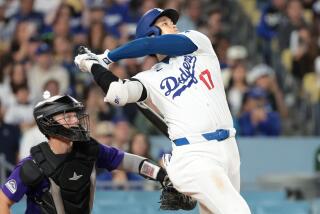Will Rafael Nadal’s cramp collapse at U.S. Open affect tennis match?
While the explanation for Rafael Nadal’s agonized collapse during a press conference may have seemed underwhelming -- just cramps, the Spanish tennis star explained after getting to his feet several minutes later -- American Andy Roddick said he wasn’t surprised that Nadal slumped to the ground.
“When you go to bed and your foot cramps, it’s the same thing but your entire leg,” he explained in an AFP story. “That’s just a matter of what part of your body cramps. Cramp in your ass, you can’t sit on it anymore. Makes it tough.”
Good point, Mr. Roddick.
Roddick’s shrug-it-off attitude might be the only reasonable response to the incident Sunday -- after all, cramps can happen at any time. They’re less predictable than the heavy rain that delayed the Andy Murray-Donald Young match to Wednesday at the earliest, and their causes are mysterious and manifold. Cramps may sometimes even be the body’s attempt to protect a stress fracture -- the stiffened muscles keep the damaged bone from shifting.
More generally, the “night cramps” Roddick appeared to refer to are often thought to occur because of dehydration or low amounts of key minerals in the body, like calcium, magnesium or potassium, according to Medline, a service under the National Institutes of Health.
But cramps can also be caused by exercise -- and can occur even hours after the physical exertion is over. The press conference occurred about two hours after Nadal beat his friend David Nalbandian in the third round of the U.S. Open.
Then again, cramps can also be an issue when you’re pregnant -- which is probably not something Nadal’s dealing with. So perhaps it’s best not to draw any hasty conclusions.
Nadal appears to be treating the incident as simply bad luck that the episode was caught on camera, and it’s unlikely it’ll affect his game.
In any case, the best thing you can probably do about a charley horse? Rehydrate, maybe eat a potassium-rich banana or other mineral-rich foods. The Mayo Clinic also suggests some common-sense preventive measures.
Follow me on Twitter @LAT_aminakhan.
More to Read
Go beyond the scoreboard
Get the latest on L.A.'s teams in the daily Sports Report newsletter.
You may occasionally receive promotional content from the Los Angeles Times.











